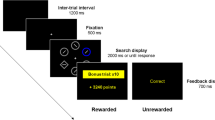Abstract
The present study examined the ability to experimentally manipulate the cognitive heuristic entitled the “illusion of control.” Five adult human females gambled at roulette for the opportunity to earn course extra-credit points. An alternating treatments design was utilized whereby in one condition subjects were allowed to select the location on the roulette board they placed their bets, and in the other condition subjects had to give their chips to the experimenter to select the location. In addition, after subjects had played the game for a number of trials, inaccurate rules related to this “illusion of control” were introduced in a multiple baseline fashion across subjects, later followed by accurate rules. Results show that the control heuristic may exist for subjects, yet that it can be brought under experimental control through the use of experimenter delivered instructions. Implications for a behavioral treatment of gambling and for a within-subject approach to the study of rule-governed behavior are discussed.
Similar content being viewed by others
References
BARON, A., & GALIZIO, M. (1983). Instructional control of human operant behavior. The Psychological Record, 33, 495–520.
CALDWELL, G. T. (1974). The gambling Australian. In D. E. Edgar (Ed.), Social change in Australia (pp. 13–23). Melbourne, Australia: Cheshire.
CATANIA, A. C. (1998). Learning (4th ed.). New York: Prentice Hall.
CATANIA, A. C., MATTHEWS, B. A., & SHIMOFF, E. (1982). Instructed versus shaped human verbal behavior: Interactions with nonverbal responding. Journal of the Experimental Analysis of Behavior, 38, 233–248.
CRITCHFIELD, T. S., & PERONE, M. (1990). Verbal self-reports as a function of speed, accuracy, and reinforcement of the reported performance. The Psychological Record, 40, 541–554.
DICKERSON, M. G., FABRE, J., & BAYLISS, D. (1986). A comparison of Tab customers and poker machine players. In J. McMillen (Ed.), Gambling in the 80’s. Griffith University, Queensland: National Association for Gambling Studies.
DIXON, M. R., HAYES, L. J., & ABAN, I. (2000). Accurate rules, inaccurate rules, and self-rules: Gambling as a verbally maintained behavior. The Psychological Record, 50, 687–704.
DIXON, M. R., HAYES, L. J., & EBBS, R. E. (1998). Engaging in illusionary control during repeated risk-taking. Psychological Reports, 83, 959–962.
DIXON, M. R., HAYES, L. J., REHFELDT, R. A., & EBBS, R. E. (1998). An adjusting procedure for studying outcomes of risk-taking. Psychological Reports, 82, 1047–1050.
DIXON, M. R., MACLIN, O. H., & HAYES, L. J. (1999). Towards a molecular analysis of video poker playing. Behavior Research Methods, Instruments, and Computers, 31, 185–187.
HAYES, S. C (1987). Rule-governed behavior: Cognitions, contingencies, and instructional control. New York: Plenum Press.
HAYES, S. C., BROWNSTEIN, A. J., HAAS, J. Ft., & GREENWAY, D. E. (1986). Instructions, multiple schedules, and extinction: Distinguishing rule- governed behavior from schedule-controlled behavior. Journal of the Experimental Analysis of Behavior, 46, 137–147.
HAYES, S. C., BROWNSTEIN, A. J., ZETTLE, R. D., ROSENFARB, L., & KORN, Z. (1986). Rule-governed behavior and sensitivity to changing consequences of responding. Journal of the Experimental Analysis of Behavior, 45, 237–256.
KAHNEMAN, D., & TVERSKY, A. (1972). Subjective probability: A judgement of representativeness. Cognitive Psychology, 3, 430–454.
KNAPP, T. J. (1998). Behaviorism and public policy: B. R Skinner’s views on gambling. Behavior and Social issues, 7, 129–139.
LADOUCEUR, Ft., GABOURY, A., DUMONT, M., & ROCHETTE, R (1988). Gambling: the relation between the frequency of wins and irrational thinking. Journal of Psychology, 122, 409–414.
LANGER, E. J. (1975). The illusion of control. Journal of Personality and Social Psychology 32, 311–328.
LEFRANCOIS, J. R., CHASE, F. N., & JOYCE, J. H. (1988). The effects of a variety of instructions on human fixed-interval performance. Journal of the Experimental Analysis of Behavior, 49, 383–393.
PRESSON, P. K., & DENASSI, V. A. (1996). Illusion of control: A meta-analytic review. Journal of Social Behavior and Personality, 11, 493–510.
SHIMOFF, E., MATTHEWS, B. A., & CATANIA, A. C. (1986). Human operant performance: Sensitivity and pseudosensitivity to contingencies. Journal of the Experimental Analysis of Behavior, 46, 149–157.
VAUGHAN, M. E. (1985). Repeated acquisition in the analysis of rule-governed behavior. Journal of the Experimental Analysis of Behavior, 44, 175–184.
Author information
Authors and Affiliations
Corresponding author
Additional information
Data collection for this study occurred while the author was affiliated with Trinity Services, Inc.
Rights and permissions
About this article
Cite this article
Dixon, M.R. Manipulating the Illusion of Control: Variations in Gambling as a Function of Perceived Control Over Chance Outcomes. Psychol Rec 50, 705–719 (2000). https://doi.org/10.1007/BF03395379
Published:
Issue Date:
DOI: https://doi.org/10.1007/BF03395379



